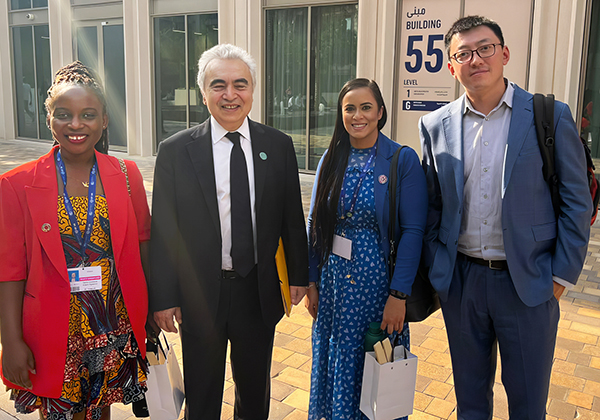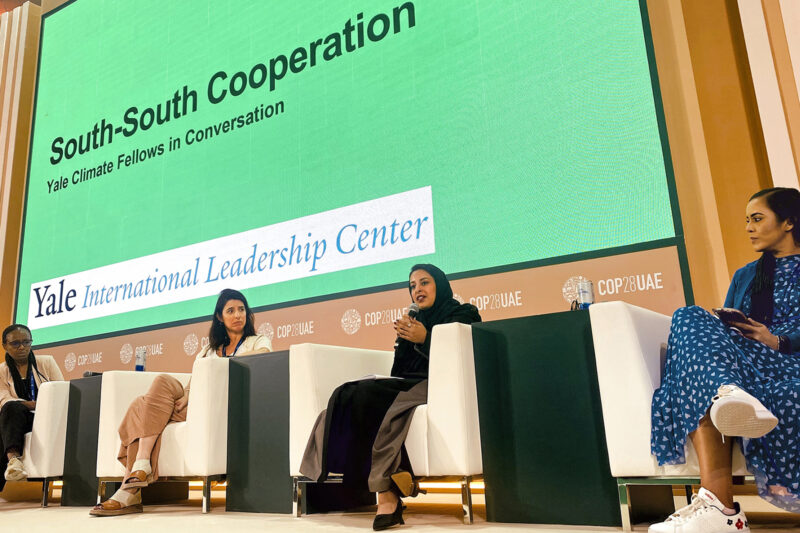The recent UN climate summit in Dubai was a chance for a group of Climate Fellows to reunite — and to dig into climate solutions in the Global South.
During a panel event at last month’s UN climate conference in Dubai, Brurce M. Mecca, a climate policy advisor from Indonesia, and Naomi Wagura, an energy expert based in Kenya, swapped ideas for financing clean-energy transitions in countries within the Global South. They did so as friends, colleagues, and fellow Yalies.
Both are members of the inaugural cohort of the Emerging Climate Leaders Fellowship program, based at the Yale Jackson School of Global Affairs’ International Leadership Center (ILC), which seeks to create a community of rising climate change and clean energy leaders from emerging and developing countries.
The group of 16 Climate Fellows completed the six-month program last April. But the network forged by the group is just beginning its work, as evidenced by the fact that 11 of fellows gathered in Dubai for COP28, known formally as the 28th United Nations Climate Change Conference.
“It was exciting that 11 of us managed to go, but not so surprising given that we all work on climate from different angles,” said Wagura, who works for the Global Energy Alliance for People and Planet, overseeing programs in several African countries to address “energy poverty” by providing communities access to electricity.
“It felt a like a reunion and gave us the chance to talk with each other privately and on stage before audiences. I’m always surprised by the conversations I have with the other fellows.”
The fellows were part of a strong Yale delegation at COP28 that demonstrated the university’s leadership in confronting climate change. During the conference, which ran from Nov. 30 to Dec. 12, the Yale School of the Environment (YSE) and the Yale Planetary Solutions Project hosted a series of events at the higher-education pavilion that highlighted the university’s solutions-focused, multidisciplinary approach to addressing the climate crisis.
It also marked the first time that the Jackson School and ILC had a coordinated presence at the conference. In addition to the Climate Fellows, participants included ILC Director Emma Sky; Paul Simons, founding director of the Yale Emerging Climate Leaders Fellowship; and a large group representing the Maurice R. Greenberg World Fellows Program, a Jackson School initiative that seeks to build a network of international leaders from different places, backgrounds, and disciplines committed to improving the world.
“I was especially proud to see our first cohort of Yale Climate Fellows shine on a major global stage,” said Simons, former U.S. ambassador to Chile and chief operating officer of the International Energy Agency (IEA) from 2015 to 2020. “It was truly rewarding to watch them in action — joining World Fellows and Yale faculty on thematic panels and private discussions across the full range of global climate challenges — from trade to human capital development to sustainable mobility to climate finance.
“These interactions demonstrate the unique value of the ILC concept of developing exceptional rising leaders who can support and mentor each other.”
‘It’s a brain trust’
For the Climate Fellows — a group of future climate leaders from across Asia, Africa, the Middle East, Latin America, and the Caribbean — the network-building actually began in November 2022. It was then that the group met for the first time on the Yale campus for a series of meetings with members of numerous climate-related research centers on campus (including the Yale Program on Climate Change Communication and the Yale Center for Natural Carbon Capture) and faculty members working on a range of climate-related issues.
Over the next six months the fellows also convened in New York City for discussions with a variety of climate practitioners; traveled to Paris for a weeklong series of meetings with policymakers, climate experts, and staff from the IEA; and met regularly during remote sessions with top international experts on issues related to climate change and the transition to a clean energy economy.
But the program also encourages participants to stay connected with each other, and with Yale, after their fellowships end, said Yuval Ben-David, the ILC program manager, who coordinates the fellowship program.
“The idea is to build a team going forward,” Ben-David said. “It’s a brain trust. These are impressive people, and they have a lot to teach each other. We try to tailor the program to the fellows’ interests. A lot of energy goes into team building.”
For this group, the climate summit in Dubai offered the perfect stage to get the team back together.
Indeed, there were several chances for the fellows to work together, including panel discussions with Yale World Fellows, programs relevant to each individual’s region and expertise, and a special event hosted by the ILC on opportunities for cooperation among countries in the Global South. During the latter event, experts discussed, among other things, climate financing, electric transportation, and human capital in Africa.

In one conversation, Mecca and Wagura discussed methods for financing climate-related interventions with another Climate Fellow, Utkarsh Patel, an economist and an associate fellow at the Center for Social and Economic Progress in New Delhi, India.
For Mecca, that conversation exemplified what he most valued from the program: the chances it provided to exchange potential climate solutions with seasoned practitioners from the Global South. (The Global South broadly comprises developing countries in Africa, Latin America and the Caribbean, Asia, and Oceania.)
“The fellowship has caused a shift in my thinking,” said Mecca, a Jakarta-based senior analyst at Climateworks Centre, a think tank located within the Monash Sustainable Development Institute in Australia. “It made me realize that Indonesia is in the same boat with other countries in the Global South and that we can look internally and work with each other to address climate challenges instead of simply relying on the conventional relationship with the Global North.”
The experience, he said, also showed that the challenges facing Indonesia are similar to those being confronted by others across the world — including in the Caribbean.
“We have a lot of things in common regarding climate issues, we just happen to be half a globe away from each other,” Mecca said. “There are things I can learn from the Caribbean, particularly how they build community resilience and how they handle climate impacts and plan disaster risk reduction.”
Wagura, the Kenya-based energy expert, also values the community that has emerged from the fellowship.
“It’s great to have a network of people from across the world on climate solutions,” she said. “A few of us work in the energy sector, which gives me a chance to learn about the kinds of initiatives that are working in Indonesia, Vietnam, and other countries undergoing energy transformations. But the program also creates external networks. Through it, I’ve been introduced to World Fellows, Yale faculty, and practitioners from all over, which is very valuable.”
During his COP28 panel discussion on how to finance climate-related projects, Mecca described efforts in Indonesia to channel funding for climate and clean-energy solutions through waqf, charitable endowments held in trust under Islamic law.
That initiative made Wagura think of the payments sent home by Africans working outside of the continent. Perhaps, she wondered, there could be a program that directs some portion of that funding to climate and clean-energy initiatives?
“It seems there is an opportunity to have remittances flowing into the continent to help fund mitigation, adaptation, and resiliency programs,” she said. “Our entire discussion was about thinking creatively about where the money for solutions should come from. Different countries have different solutions, but it’s clear that there are things that we in the Global South could be doing for ourselves.”
This story originally appeared in YaleNews
